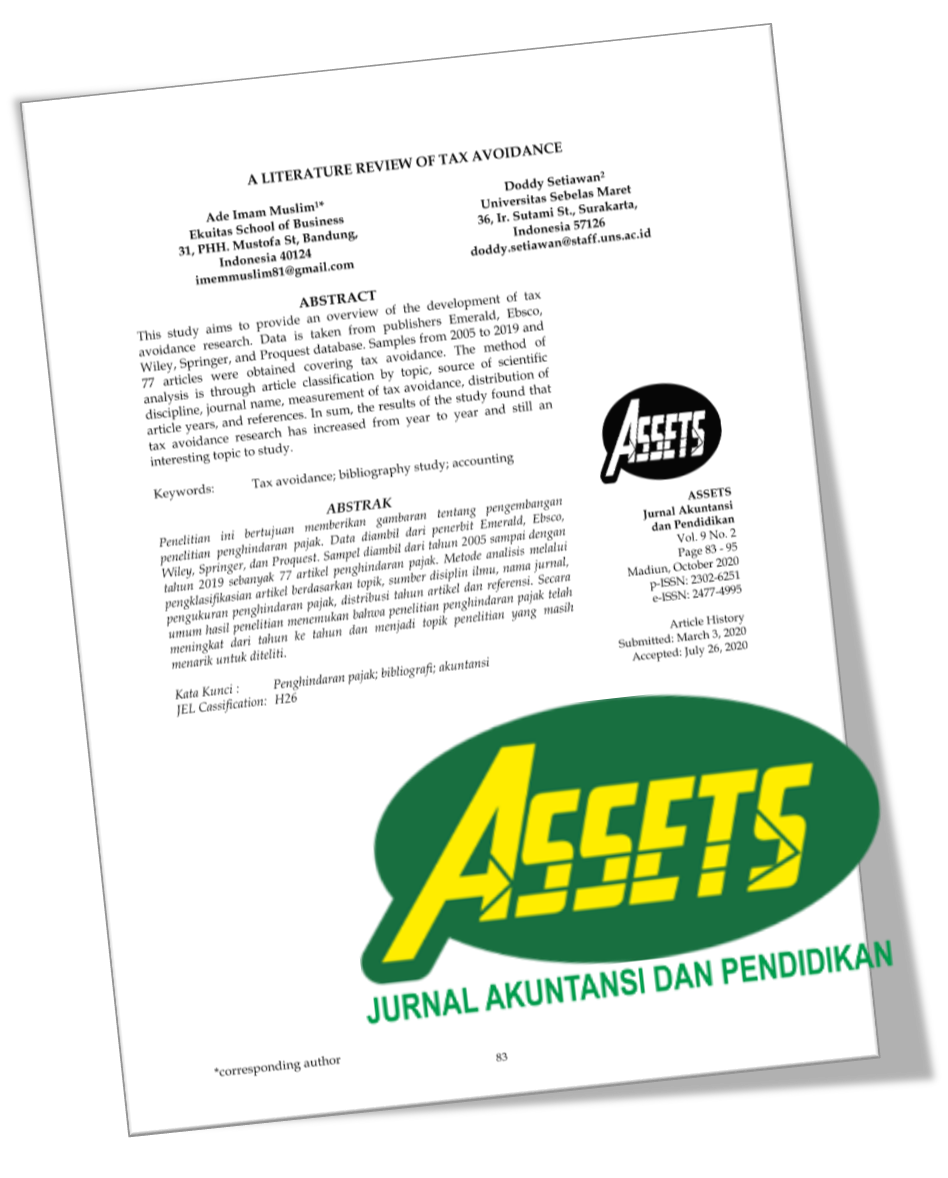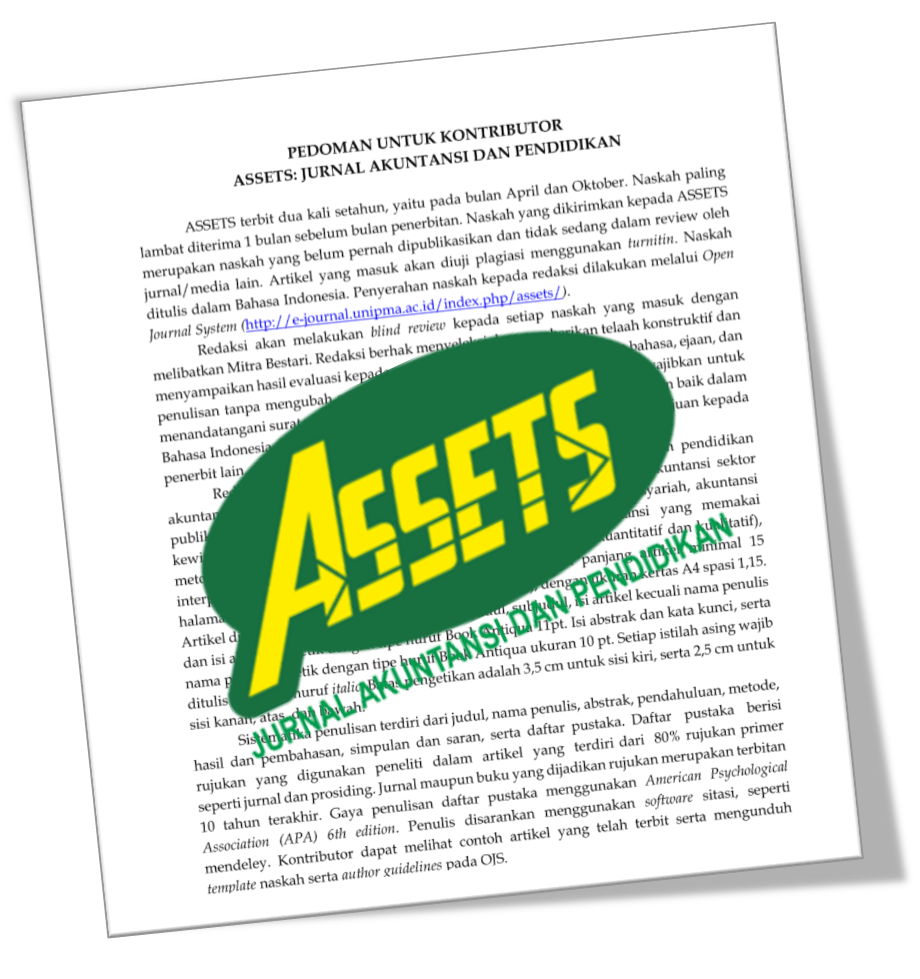MULTITASKING MEDIA, ONLINE VIGILANCE, LOCUS OF CONTROL, AND STUDENT ACADEMIC PERFORMANCE
DOI:
https://doi.org/10.25273/jap.v11i2.12109Keywords:
Student Academic Performance, Locus of Control, Media Multitasking, Online Vigilance, Kinerja Akademik MahasiswaAbstract
ABSTRACT
One of the factors determining how effectively learning is implemented in higher education is student academic performance. This study aims to ascertain how student academic performance is impacted by media multitasking, online vigilance, and locus of control. This type of study is a descriptive quantitative study with a sample size of 169 students. The type of data used is primary data. Data analysis used multiple linear regression analysis. The results of this study indicate that multitasking media and online vigilance significantly negatively affect student academic performance, while locus of control has no effect. Thus, it is hoped that the study would be used by students as another resource to be considered while using online resources for learning.
ABSTRAK
Kinerja akademik mahasiswa merupakan salah satu indikator yang menentukan baik atau buruknya kualitas penyelenggaraan pembelajaran di perguruan tinggi. Penelitian ini bertujuan untuk mengetahui pengaruh multitasking media, online vigilance, dan locus of control terhadap kinerja akademik mahasiswa. Jenis penelitian ini merupakan kuantitatif eksplanatif survei. Teknik sampling yang digunakan adalah purposive sampling method dengan jumlah sampel 169 mahasiswa. Jenis data yang digunakan adalah data primer. Analisis data menggunakan analisis regresi linier berganda. Hasil penelitian ini menunjukkan multitasking media dan online vigilance berpengaruh negatif secara signifikan terhadap kinerja akademik mahasiwa, sedangkan locus of control tidak berpengaruh. Dengan demikian, diharapkan penelitian dimanfaatkan sebagai tambahan referensi untuk dipertimbangkan oleh mahasiswa dalam penggunaan perangkat online ketika melaksanakan pembelajaran.
Downloads
References
Abdullah, S. M. (2019). Social Cognitive Theory: A Bandura Thought Review Published in 1982-2012. Psikodimensia, 18(1), 85. https://doi.org/10.24167/psidim.v18i1.1708
Abramova, O., Baumann, A., Krasnova, H., & Lessmann, S. (2017). To Phub or Not to Phub: Understanding Off-Task Smartphone Usage and Its Consequences in the Academic Environment. European Conference on Information Systems (ECIS), 13 (4),1984–1999. https://doi.org/10.1109/FIE.2011.6142991
Achadiyah, B. N., & Laily, N. (2013). Pengaruh Locus of Control Terhadap Hasil Belajar Mahasiswa Akuntansi. Jurnal Pendidikan Akuntansi Indonesia, 11(2), 11–18. https://doi.org/10.21831/jpai.v11i2.1687
Albert, M. A., & Dahling, J. J. (2016). Learning Goal Orientation and Locus of Control Interact to Predict Academic Self-Concept and Academic Performance in College Students. Personality and Individual Differences, 97(5), 245–248. https://doi.org/10.1016/j.paid.2016.03.074
Alghamdi, A., Karpinski, A. C., Lepp, A., & Barkley, J. (2020). Online and Face-to-Face Classroom Multitasking and Academic Performance: Moderated Mediation With Self-Efficacy for Self-Regulated Learning and Gender. Computers in Human Behavior, 102(8), 214–222. https://doi.org/10.1016/j.chb.2019.08.018
Angell, R., Gorton, M., Sauer, J., Bottomley, P., & White, J. (2016). Don’t Distract Me when I’m Media Multitasking: Toward a Theory for Raising Advertising Recall and Recognition. Journal of Advertising, 45(2), 198–210. https://doi.org/10.1080/00913367.2015.1130665
Aziz, A. (2018). Education 4.0 Made Simple: Ideas for Teaching. International Journal of Education and Literacy Studies, 6(3), 92-105. https://doi.org/10.7575/aiac.ijels.v.6n.3p.92
Azlan, A. A. et al. (2020) 'Public knowledge, attitudes and practices towards COVID-19: A cross-sectional study in Malaysia', PLOS ONE. Edited by W.- J. Tu, 15(5), p. e0233668. DOI: https://doi.org/10.1371/journal.pone.0233668.
Bacon, D. R., & Bean, B. (2006). GPA in Research Studies: An Invaluable but Neglected Opportunity.Journal of Marketing Education, 28(1), 35–42. https://doi.org/10.1177/0273475305284638
Bandura, A. (1989). Human Agency in Social Cognitive Theory. American Psychologist, 44(9), 1175–1184.https://doi.org/10.1017/j.paid.2018.03.274
Bandura, A. (2001). Social Cognitive Theory: Perspectives on Psychological Science. 52(4), 1–26. https://doi.org/10.1080/15252019.2014.884480
Bandura, A. (2006). Toward a Psychology of Human Agency. Perspectives on Psychological Science, 1(2), 165–180.
Bozorgi, S. (2009). On the Relationship between Locus of Control and the Grade Point Average of the Iranian Azad University EFL Students. The teaching of Psychology,44(1), 71–87. https://doi.org/10.1177/0098628316677913
Budhianto, B. (2020). Analisis Perkembangan dan Faktor yang Mempengaruhi Keberhasilan Pembelajaran Daring (E-Learning ). Jurnal Agriwidya, 1(1), 11–29.
Burchell, K. (2015). Tasking the Everyday: Where Mobile and Online Communication Take Time. Mobile Media and Communication, 3(1), 36–52. https://doi.org/10.1177/2050157914546711
Cassidy, S., & Eachus, P. (2000). Learning Style, Academic Belief Systems, Self-Report Student Proficiency and Academic Achievement in Higher Education. Educational Psychology, 20(3), 307–322. https://doi.org/10.1080/713663740
Cheever, N. A., Rosen, L. D., Carrier, L. M., & Chavez, A. (2014). Out of Sight is Not Out of Mind: The Impact of Restricting Wireless Mobile Device Use on Anxiety Levels among Low, Moderate and High Users. Computers in Human Behavior, 37(8), 290–297. https://doi.org/10.1016/j.chb.2014.05.002
Clayton, R. B., Leshner, G., & Almond, A. (2015). The Extended Itself: The Impact of iPhone Separation on Cognition, Emotion, and Physiology. Journal of Computer-Mediated Communication, 20(2), 119–135. https://doi.org/10.1111/jcc4.12109
Curtis, N. A., & Trice, A. D. (2013). A Revision of the Academic Locus of Control Scale for College Students.Perceptual and Motor Skills, 116(3), 817–829. https://doi.org/10.2466/08.03.PMS.116.3.817-829
Demirbilek, M., & Talan, T. (2017). The Effect Of Social Media Multitasking On Classroom Performance. Active Learning in Higher Education.
Didier, T., Kreiter, C. D., Buri, R., & Solow, C. (2006). Investigating the Utility of a GPA Institutional Adjustment Index. Advances in Health Sciences Education, 11(2), 145–153. https://doi.org/10.1007/s10459-005-0390-0
Domahidi, E. (2018). The Associations between Online Media Use and Users’ Perceived Social Resources: A Meta-Analysis.Journal of Computer-Mediated Communication, 23(4), 181–200. https://doi.org/10.1093/jcmc/zmy007
Drago, A., Rheinheimer, D. C., & Detweiler, T. N. (2018). Effects of Locus of Control, Academic Self-Efficacy, and Tutoring on Academic Performance. Journal of College Student Retention: Research, Theory and Practice, 19(4), 433–451. https://doi.org/10.1177/1521025116645602
Duff, B. R.-L., Yoon, G., Wang, Z. (Glenn),& Anghelcev, G. (2014). Doing It All: An Exploratory Study of Predictors of Media Multitasking. Journal of Interactive Advertising, 14(1), 11–23. https://doi.org/10.1080/15252019.2014.884480
Foehr, U. G. (2006). Media Multitasking among American Youth: Prevalence, Predictors, and Pairings. The Henry J. Kaiser Family Foundation,52(7), 1–26. https://doi.org/10.1080/15252019.2014.884480
Fried, C. B. (2008). In-Class Laptop Use and Its Effects on Student Learning. Computers and Education, 50(3), 906–914. https://doi.org/10.1016/j.compedu.2006.09.006
Ghasemzadeh, A., & Maryam, S. (2011).Locus of Control in Iranian University Students and Its Relationship with Academic Achievement. Procedia - Social and Behavioral Sciences, 30(6), 2491–2496. https://doi.org/10.1016/j.sbspro.2011.10.486
Ghozali, I. (2016). Apilikasi Analisis Multivariete dengan Program IBM SPSS 23,Bandung: Badan Penerbit Universitas Diponegoro
Gikas, J., & Grant, M. M. (2013). Internet and Higher Education Mobile Computing Devices in Higher Education : Student Perspectives on Learning with Cellphones, Smartphones,& Social Media. The Internet and Higher Education, 19(5), 18–26. https://doi.org/10.1016/j.iheduc.2013.06.002
Guney, Y. (2010). Exogenous and Endogenous Factors Influencing Students’ Performance in Undergraduate Accounting Modules. Accounting Education, 18(1), 51–73. https://doi.org/10.1080/09639280701740142
Hair, J. J. F., Black, W. C., Babin, B. j, & Anderson, R. E. (2019). Multivariate Data Analysis a Global Perspective (7th Ed). New Jersey: Pearson Prentice Hall.
Hopkins, C., Ferrell, O. C., Ferrell, L., Hopkins, K., & Merkle, A. C. (2020). Self-Efficacy, Locus of Control and Engagement as Determinants of Grades in a Principles of Marketing Class. Marketing Education Review, 30(4), 236–251. https://doi.org/10.1080/10528008.2020.1837634
Jacobsen, W. C., & Forste, R. (2011). The wired generation: Academic and Social Outcomes of Electronic Media Use among University Students. Cyberpsychology, Behavior, and Social Networking, 14(5), 275–280. https://doi.org/10.1089/cyber.2010.0135
Jeong, S. H., & Fishbein, M. (2007). Predictors of Multitasking with Media: Media Factors and Audience Factors. Media Psychology, 10(3), 364–384. https://doi.org/10.1080/15213260701532948
Johannes, N., Meier, A., Reinecke, L., Ehlert, S., Setiawan, D. N., Walasek, N., Dienlin, T., Buijzen, M., & Veling, H. (2020). The Relationship between Online vigilance and Affective Well-Being in Everyday Life: Combining Smartphone Logging with Experience Sampling.Media Psychology, 17(4), 1–25. https://doi.org/10.1080/15213269.2020.1768122
Joo, Y. J., Lim, K. Y., & Kim, J. (2013).Locus of Control, Self-Efficacy, And Task Value as Predictors of Learning Outcome in an Online University Context. Computers and Education, 62(2), 149–158. https://doi.org/10.1016/j.compedu.2012.10.027
Judd, T. (2013). Making Sense of Multitasking: Key Behaviours.Computers and Education, 63(5), 358–367. https://doi.org/10.1016/j.compedu.2012.12.017
Junco, R., & Cotten, S. R. (2012). No A 4 U: The Relationship between Multitasking and Academic Performance. Computers and Education, 59(2), 505–514. https://doi.org/10.1016/j.compedu.2011.12.023
Katz, L., & Lambert, W. (2016). A Happy and Engaged Class without Cellphones? It’s Easier than You Think. The teaching of Psychology, 43(4), 340–345. https://doi.org/10.1177/0098628316662767
Klimmt, C., Hefner, D., Reinecke, L., Rieger, D., Vorderer, P., Vorderer, C. P., Hefner, D., Reinecke, L., & Permanently, C. K. E. (2018). The Permanently Online and Permanently Connected Mind: Mapping the Cognitive Structures behind Mobile Internet Use Christoph. Computers and Education, 64(2), 18–28. https://doi.org/10.1186/s41239-018-0096-m
Kraushaar, J. M., & Novak, D. C. (2006). Examining the Effects of Student Multitasking with Laptops during the Lecture. Journal of Information Systems Education, 21(2), 241–252.
Kus, F., & Has, T. (2016). Modeling Smartphone Addiction : The Role of Smartphone Usage, Self- Regulation , General Self-Efficacy, and Cyberloafing in University Students. Computers in Human Behavior63(5),19–29. https://doi.org/10.1016/j.chb.2016.05.091
Lau, W. W. F. (2017). Effects of Social Media Usage and Social Media Multitasking on the Academic Performance of University Students.Computers in Human Behavior, 68(6), 286–291. https://doi.org/10.1016/j.chb.2016.11.043
Le roux, B., Parry, D. A., Totolo, A., Izawa, G., Holloway, J., Prenter, A., & Botha, L. (2020). Media Multitasking, Online vigilance, and Academic Performance among Students in Three Southern African Countries. Computers and Education, 160(6),104-123. https://doi.org/10.1016/j.compedu.2020.104056
Lestari, P. (2010). Analisis Faktor-Faktor yang Memengaruhi Prestasi Akademik Mahasiswa pada Mata Kuliah Pengantar Akuntansi. Jurnal Manajemen dan Akuntansi, 11(2), 144–152.
Levenson, P. (2010). Activism and Powerful Others : Distinctions within the Concept of Internal-External Control. Journal of Personality, 1(15), 37–41. https://doi.org/10.1080/00223891.1974.10119988
Loh, K. K., Tan, B. Z. H., & Lim, S. W. H. (2016). Media Multitasking Predicts Video-Recorded Lecture Learning Performance through Mind Wandering Tendencies. Computers in Human Behavior, 63(5), 943–947. https://doi.org/10.1016/j.chb.2016.06.030
Lui, K. F. H., & Wong, A. C. N. (2012). Does Media Multitasking Always Hurt? A Positive Correlation between Multitasking and Multisensory Integration. Psychonomic Bulletin and Review, 19(4), 647–653. https://doi.org/10.3758/s13423-012-0245-7
Luo, J., Sun, M., Yeung, P., & Li, H. (2018). Development and Validation of a Scale to Measure Media Multitasking among Adolescents: Results from China. Children and Youth Services Review, 95(8), 377–383. https://doi.org/10.1016/j.childyouth.2018.10.044
Luo, J., Yeung, P., & Li, H. (2020). The Relationship among Media Multitasking, Academic Performance and Self-Esteem in Chinese Adolescents: The Cross-Lagged Panel and Mediation Analyses.Children and Youth Services Review, 117(7), 105-128. https://doi.org/10.1016/j.childyouth.2020.105308
May, K. E., & Elder, A. D. (2018). Efficient, Helpful, or Distracting? A Literature Review of Media Multitasking about Academic Performance.International Journal of Educational Technology in Higher Education, 15(1),542–553. https://doi.org/10.1186/s41239-018-0096-z
Mayer, R. E., & Moreno, R. (2016). Nine Ways to Reduce Cognitive Load in Multimedia Learning. Educational Psychologist, 38(1), 43–52.https://doi.org/10.1016/j.chb.2016.08.039
Mediawati, E. (2010). Pengaruh Kompetensi Dosen, Kurikulum, dan Motivasi terhadap Prestasi Belajar Mahasiswa. Jurnal Pendidikan Ekonomi: Dinamika Pendidikan, 5(1), 134–146. https://doi.org/10.47467/reslaj.v1i1.67
Micomonaco, J. P., & Espinoza, B. D. (2019). Psychological Mind-Set and Student Success: The Importance of Internal Locus of Control in Students Who Overachieve. Journal of College Student Retention: Research, Theory, and Practice. 116(3), 105-128. https://doi.org/10.1177/1521025119895981
Mihailidis, P. (2014). A Tethered Generation: Exploring the Role of Mobile Phones in the Daily Life of Young People. Mobile Media and Communication, 2(1), 58–72. https://doi.org/10.1177/2050157913505558
Naveh-Benjamin, M., & Guez, J. (2000). Effects of Divided Attention on Encoding and Retrieval Processes: Assessment of Attentional Costs and a Componential Analysis. Journal of Experimental Psychology: Learning Memory and Cognition, 26(6), 1461–1482. https://doi.org/10.1037/0278-7393.26.6.1461
Noemy, M. S., Inés G., R., Cristina, I. G., & Patricia, A. P. (2017). Exploring Academic Performance: Looking beyond Numerical Grades. Universal Journal of Educational Research, 5(7), 1105–1112. https://doi.org/10.13189/ujer.2017.050703
Paas, F., Camp, G., & Rikers, R. (2001). Instructional compensation for age-related cognitive declines: Effects of goal specificity in maze learning. Journal of Educational Psychology, 93, 181–186.
Parry, D. A., & Le-Roux, D. B. (2019). Media Multitasking and Cognitive Control: A Systematic Review of Interventions. Computers in Human Behavior, 92(6), 316–327. https://doi.org/10.1016/j.chb.2018.11.031
Parry, D. A., Le-Roux, D. B., & Bantjes, J. R. (2020). Testing the Feasibility of a Media Multitasking Self-Regulation Intervention for Students: Behaviour Change, Attention, and Self-Perception. Computers in Human Behavior, 104(8), 106-132. https://doi.org/10.1016/j.chb.2019.106182
Parry, D. A., Le-Roux, D. B., & Cornelissen, L. A. (2019). Managing in Lecture Media Use: The Feasibility and Value of a Split Class Policy.Journal of Computing in Higher Education, 32(2), 261–281. https://doi.org/10.1007/s12528-019-09232-z
Patterson, M. C. (2017). A Naturalistic Investigation of Media Multitasking while Studying and the Effects on Exam Performance. The teaching of Psychology, 44(1), 51–57. https://doi.org/10.1177/0098628316677913
Pilotta, J. J., Schultz, D. E., Drenik, G., & Rist, P. (2004). Simultaneous Media Usage: A Critical Consumer Orientation to Media Planning. Journal of Consumer Behaviour, 3(3), 285–292. https://doi.org/10.1002/cb.141
Poropat, A. E. (2009). A Meta-Analysis of the Five-Factor Model of Personality and Academic Performance. Psychological Bulletin, 135(2), 322–338. https://doi.org/10.1037/a0014996
Priyatno, D. (2017). Panduan Praktis Olah Data Menggunakan SPSS. Yogyakarta: CV.Andi Offset
Rahayu, S. E., & Febriaty, H. (2017). Penerapan Model Pembelajaran Contextual Teaching and Learning (CTL) untuk Meningkatkan Pemahaman Materi Pasar Valuta Asing pada Mata Kuliah Ekonomi Internasional 2 (Studi Mahasiswa Semester 5 Jurusan Ekonomi Pembangunan Fakultas Ekonomi UMSU). Jurnal Ilmiah Manajemen dan Bisnis, 17(2), 94–107. https://doi.org/10.30596/jimb.v17i2.960
Ramadhan, R. P., & Winata, H. (2016). Prokrastinasi Akademik Menurunkan Prestasi Belajar Siswa. Jurnal Pendidikan Manajemen Perkantoran, 1(1), 154. https://doi.org/10.17509/jpm.v1i1.3260
Reinecke, L., Klimmt, C., Meier, A., Reich, S., Hefner, D., Knop-Huelss, K., Rieger, D., & Vorderer, P. (2018). Permanently Online and Permanently Connected: Development and Validation of the Online vigilance Scale. Computers in Human Behavior,13(10). https://doi.org/10.1371/journal.pone.0205384
Rotter, J.B., 1996. Generalized Expectancies for Internal Versus External Control Reinforcement. Psychological Monographs, 80, No. 609.
Sadikin, A., & Hamidah, A. (2019). Research ArticleDaring di Tengah Wabah Covid-19. Jurnal Ilmiah Pendidikan Biologi, 6(2), 187–192. https://doi.org/10.17509/t.v6i2.20887
Santokhie, S., & Lipps, G. E. (2020). Development and Validation of the Tertiary Student Locus of Control Scale. Educational Studies, 10(1), 120-134. https://doi.org/10.1177/2158244019899061
Savoji, A. P., Niusha, B., & Boreiri, L. (2013). Relationship between Epistemological Beliefs, Self-Regulated Learning Strategies, and Academic Achievement. Procedia-Social and Behavioral Sciences, 84(6), 1160–1165. https://doi.org/10.1016/j.sbspro.2013.06.719
Shelia R. Cotten, Rebecca G. Adams, B. M. M. (2011). Technological Influences on Social Ties Across the Lifespan Technological Influences on Social Ties Across the Lifespan. In K.L. Fingerm, 64(7), 166–179
Sugeng, B. (2020). Fundamental Metodologi Penelitian Kuantitatif (Eksplanatif). Jogjakarta:CV Budi Utama.
Suphi, N., & Yaratan, H. (2012). Effects of Learning Approaches, Locus of Control, Socio-Economic Status, and Self-Efficacy on Academic Achievement: A Turkish Perspective. Educational Studies, 38(4), 419–431. https://doi.org/10.1080/03055698.2011.643107
Sutarto, S. (2017). Teori Kognitif dan Implikasinya dalam Pembelajaran. Islamic Counseling: Jurnal Bimbingan Konseling Islam, 1(2), 1-10. https://doi.org/10.29240/jbk.v1i2.331
Tindell, D. R., & Bohlander, R. W. (2012). The Use and Abuse of Cellphones and Text Messaging in the Classroom: A Survey of College Students. College Teaching, 60(1), 1–9. https://doi.org/10.1080/87567555.2011.604802
Trice, A. D. (1985). An Academic Locus of Control Scale for College Students. Perceptual and Motor Skills, 61(3), 1043–1046. https://doi.org/10.2466/pms.1985.61.3f.1043
Voorveld, H. A. M. (2011). Media Multitasking and the Effectiveness of Combining Online and Radio Advertising. Computers in Human Behavior, 27(6), 2200–2206. https://doi.org/10.1016/j.chb.2011.06.016
Voorveld, H. A. M., & Viswanathan, V. (2015). An Observational Study on How Situational Factors Influence Media Multitasking with TV: The Role of Genres, Dayparts, and Social Viewing. Media Psychology, 18(4), 499–526. https://doi.org/10.1080/15213269.2013.872038
Vorderer, P., Krömer, N., & Schneider, F. M. (2016). Permanently Online - Permanently Connected: Explorations into University Students’ Use of Social Media and Mobile Smart Devices. Computers in Human Behavior, 63(5), 694–703. https://doi.org/10.1016/j.chb.2016.05.085
Wainer, J., Dwyer, T., Dutra, R. S., Covic, A., Magalhães, V. B., Ferreira, L. R. R., Pimenta, V. A., & Claudio, K. (2008). Too Much Computer and Internet Use is Bad for Your Grades, Especially if You are Young and Poor: Results from the 2001 Brazilian SAEB. Computers and Education, 51(4), 1417–1429. https://doi.org/10.1016/j.compedu.2007.12.007
Wammes, J. D., Ralph, B. C. W., Mills, C., Bosch, N., Duncan, T. L., & Smilek, D. (2019). Disengagement during Lectures: Media Multitasking and Mind Wandering in University Classrooms. Computers and Education, 132(12), 76–89. https://doi.org/10.1016/j.compedu.2018.12.007
Watkins, D. (1987). Academic Locus of Control: A Relevant Variable at Tertiary Level?Higher Education.Media Psychology, 16(2), 221–229. https://doi.org/10.1007/BF00139044
Widodo, J. (2012). Determinan Kinerja Akademik Penyelenggaraan Pendidikan Program Pascasarjana Unnes. Jurnal Pendidikan Ekonomi:Dinamika Pendidikan, 7(2), 1–8. https://doi.org/10.15294/dp.v7i2.4903
Wiyono, G. (2011). Merancang Penelitian Bisnis dengan Alat SPSS 17.0 & Smart PLS 2.0.Yogyakarta: Unit penerbit dan Percetakan STIM YKPN Yogyakarta.
Yohanes, R. S. (2010). Teori Vygotsky dan Implikasinya terhadap Pembelajaran Matematika. Jurnal Widya Warta, 34(2), 854–1981.
Zhang, W. (2015). Learning Variables, In-Class Laptop Multitasking, and Academic Performance: A Path Analysis. Computers and Education, 81(2), 82–88. https://doi.org/10.1016/j.compedu.2014.09.012
Downloads
Additional Files
Published
Issue
Section
License
Perjanjian Lisensi dan Hak Cipta
Saat mengirimkan naskah ke jurnal, penulis menyatakan bahwa:
- Mereka diberi wewenang oleh rekan penulisnya untuk masuk ke dalam perjanjian ini.
- Karya yang dimaksud belum pernah diterbitkan secara resmi sebelumnya, kecuali dalam bentuk abstrak atau sebagai bagian dari kuliah, resensi, tesis, atau overlay jurnal yang diterbitkan.
- Karya yang dimaksud tidak sedang dipertimbangkan untuk diterbitkan di tempat lain,
- Publikasi karya yang dimaksud telah disetujui oleh semua penulis dan oleh otoritas yang bertanggung jawab - secara tahu sama tahu atau eksplisit - dari lembaga tempat pekerjaan itu dilakukan.
- Mereka mengamankan hak untuk mereproduksi materi apa pun yang telah diterbitkan atau dilindungi hak cipta di tempat lain.
- Mereka menyetujui lisensi dan perjanjian hak cipta berikut.
Hak Cipta
Penulis yang menerbitkan dengan ASSETS: Jurnal Akuntansi dan Pendidikan menyetujui persyaratan berikut:
- Penulis mempertahankan hak cipta dan memberikan jurnal hak publikasi pertama dengan karya yang secara bersamaan dilisensikan di bawah Lisensi Atribusi Creative Commons (CC BY-SA 4.0) yang memungkinkan orang lain untuk berbagi karya dengan pengakuan kepenulisan karya dan publikasi awal di jurnal ini.
- Penulis dapat masuk ke dalam pengaturan kontrak tambahan yang terpisah untuk distribusi non-eksklusif dari versi jurnal yang diterbitkan dari karya tersebut (misalnya, mempostingnya ke repositori institusional atau menerbitkannya dalam sebuah buku), dengan pengakuan publikasi awalnya di jurnal ini.
- Penulis diizinkan dan didorong untuk memposting karya mereka secara daring (misalnya di repositori institusional atau di situs web mereka) sebelum dan selama proses pengiriman, karena dapat menghasilkan pertukaran yang produktif, serta kutipan lebih awal dan lebih besar dari karya yang diterbitkan.
License and Copyright Agreement
In submitting the manuscript to the journal, the authors certify that:
- Their co-authors authorize them to enter into these arrangements.
- The work described has not been formally published before, except as an abstract or part of a published lecture, review, thesis, or overlay journal.
- That it is not under consideration for publication elsewhere,
- That its publication has been approved by all the author(s) and by the responsible authorities – tacitly or explicitly – of the institutes where the work has been carried out.
- They secure the right to reproduce any material already published or copyrighted elsewhere.
- They agree to the following license and copyright agreement.
Copyright
Authors who publish with ASSETS: Jurnal Akuntansi dan Pendidikan agree to the following terms:
- Authors retain copyright and grant the journal right of first publication with the work simultaneously licensed under a Creative Commons Attribution License (CC BY-SA 4.0) that allows others to share the work with an acknowledgment of the work's authorship and initial publication in this journal.
- Authors can enter into separate, additional contractual arrangements for the non-exclusive distribution of the journal's published version of the work (e.g., post it to an institutional repository or publish it in a book), with an acknowledgment of its initial publication in this journal.
- Authors are permitted and encouraged to post their work online (e.g., in institutional repositories or on their website) before and during submission, as it can lead to productive exchanges and earlier and more extraordinary citations of published work.

ASSETS: Jurnal Akuntansi dan Pendidikan is licensed under a Creative Commons Attribution-ShareAlike 4.0 International License.










